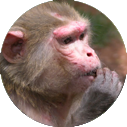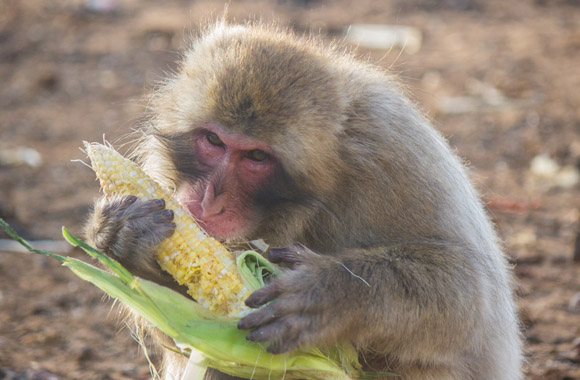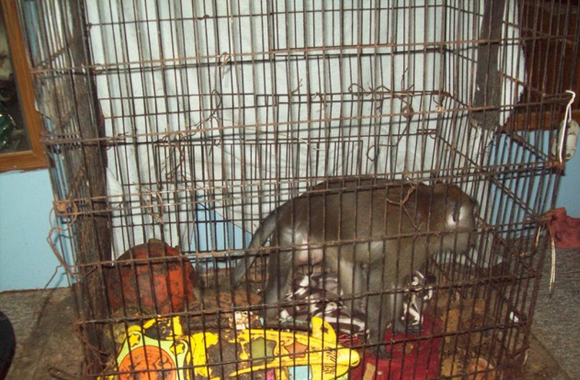About
Though International Union for Conservation of Nature (IUCN) lists 22 species of macaques (and other sources list 23), the Born Free USA Primate Sanctuary is home to six macaque species: Japanese macaques (snow monkeys), bonnet macaques, rhesus macaques, pig-tailed macaques, long-tailed macaques (also known as crab-eating macaques), and stump-tailed macaques (as well as some hybrids of more than one species). Several macaque species are imperiled.
The original inhabitants of the Born Free USA Primate Sanctuary were a troop of snow monkeys (also known as Japanese macaques) who arrived in Texas from Japan in 1972. They were part of a troop that had resided in the Arashiyama forest and had been observed by behaviorists since 1954. Around 1970, a group split away from the main troop and a concerned American citizen agreed to pay to transport the group to Encinal, Texas, where a sanctuary was then started. Today, the 175-acre site is called the Born Free USA Primate Sanctuary (link). Our sanctuary is home to approximately 550 primates (macaques, vervets, and baboons), the majority of whom are macaques.
The six species of macaques that live at the Born Free USA Primate Sanctuary have lifespans of approximately 25-30 years.

Macaques
Status
IUCN Red List classification :
Bonnet macaque – Least Concern
Japanese macaque – Least Concern
Long-tailed macaque – Least Concern
Northern Pig-tailed macaque – Vulnerable
Rhesus macaque – Least Concern
Southern Pig-tailed macaque - Vulnerable
Stump-tailed macaque – Vulnerable
CITES status : Appendix II
Endangered Species Act (ESA) Status:
Bonnet macaque - N/A
Japanese macaque – Threatened
Long-tailed macaque – N/A
Northern Pig-tailed macaque - N/A
Rhesus macaque - N/A
Southern Pig-tailed macaque - N/A
Stump-tailed macaque – Threatened
Population
Estimated number remaining in the wild: Unknown
Population decline of macaques
Bonnet macaque - Decreasing
Japanese macaque – Stable
Long-tailed macaque - Decreasing
Northern Pig-tailed macaque - Decreasing
Rhesus macaque – Unknown
Southern Pig-tailed macaque – Decreasing
Stump-tailed macaque - Decreasing
Location
Bonnet macaques are native to India. Their natural habitat ranges from wet lowlands to dry deciduous forests.
Japanese macaques are native to Japan and live in mountainous, deep-forested areas in some of the coldest environs of any primates other than human beings.
Long-tailed macaques are native to Bangladesh, Brunei Darussalam, Cambodia, India (Andaman Islands and Nicobar Islands), Indonesia, Lao PDR, Malaysia, Myanmar, Philippines, Singapore, Thailand, Timor-Leste, and Viet Nam. They have also been introduced in Mauritius, Palau, and Papua New Guinea.
Northern and Southern Pig-tailed macaques occupy a wide range of habitat throughout Southeast Asia: Bangladesh, Brunei Darussalam, Cambodia, China, India, Indonesia, Lao PDR, Malaysia, Myanmar, Thailand, and Viet Nam.
Rhesus macaques are found throughout most of South Asia: Afghanistan, Bangladesh, Bhutan, China, India, Lao PDR, Myanmar, Nepal, Pakistan, Thailand, and Viet Nam. There are also introduced populations in Hong Kong and the U.S. (Florida).
Stump-tailed macaques are found in South Asia: Cambodia, China, India, Lao PDR, Myanmar, Thailand, and Viet Nam.
Size
Bonnet macaque – 13-24 inches tall; 7.7-19.8 pounds
Japanese macaque – 20.5-22.5 inches tall; 19-25 pounds
Long-tailed macaque – 15-25.5 inches tall; 5.5-18 pounds
Northern and Southern Pig-tailed macaque – 18-22 inches tall; 10-32 pounds
Rhesus macaque – 17.75-25 inches tall; 8.75-26.5 pounds
Stump-tailed macaque – 19-25.5 inches tall; 16.5-22.5 pounds
Fun Fact
Macaque cheek pouches can hold the same volume of food as their stomachs.
Related Campaigns
Latest News and Work
May 23, 2018
Born Free USA's Primate Sanctuary
At our primate sanctuary – one of the largest in the United States – our mission is to provide monkeys as high a quality of life as we can. The 175-acre sanctuary, located in south Texas, provides a safe, permanent home to hundreds of monkeys, many rescued from abuse in roadside zoos or as pets in private homes or retired from animal experimentation.
MEET THE MONKEYS


